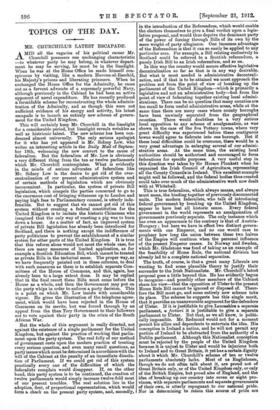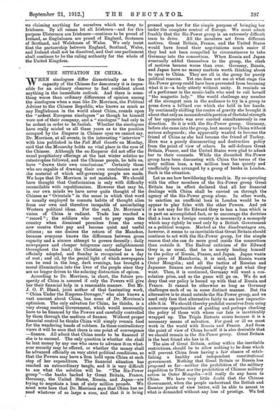TOPICS OF THE DAY.
MR. CHURCHILL'S LATEST ESCAPADE.
../MID all the vagaries of his political career Mr. Churchill possesses one unchanging characteristic —to whatever party he may belong, in whatever depart- ment he may be serving, he must be in the limelight. When he was at the Home Office he made himself con- spicuous by visiting, like a modern Haroun-al-Raschid, his Majesty's prisons and liberating prisoners. When he exchanged the Home Office for the Admiralty, he came out as a fervent advocate of a supremely powerful Navy, although previously in the Cabinet he had been an active opponent of naval expenditure. He has recently produced a formidable scheme for reconstructing the whole adminis- tration of the Admiralty, and as though this were not sufficient evidence of his energy and activity, his latest escapade is to launch an entirely new scheme of govern- ment for the United Kingdom.
This will certainly keep Mr. Churchill in the limelight for a considerable period, but limelight reveals wrinkles as well as histrionic talent. The new scheme has been con- demned almost universally. The only serious apologist for it who has yet appeared is Mr. Sidney Low, who writes an interesting article in the Daily Mail of Septem- ber 18th, welcoming the new convert to the cause of federalism. But the federalism of Mr. Low is obviously a very different thing from the ten or twelve parliaments which Mr. Churchill contemplates. What is evidently in the minds of serious advocates of federalism like Mr. Sidney Low is the desire to get rid of the over- centralization of our present administrative system and of certain methods of legislation which are obviously inconvenient. In particular, the system of private Bill legislation, which compels the parties concerned to go to the enormous cost of bringing witnesses up to London and paying high fees to Parliamentary counsel, is utterly inde- fensible. But to suggest that we cannot get rid of this system without creating a federal constitution for the United Kingdom is to imitate the historic Chinaman who imagined that the only way of roasting a pig was to burn down a house. As a matter of fact, an improved system of private Bill legislation has already been introduced for Scotland, and there is nothing except the indifference of party politicians to prevent the establishment of a similar system for other parts of the United Kingdom. It is true that this reform alone would not meet the whole case, for there are many measures of limited application, as for example a Scottish Education Bill, which cannot be treated as private Bills in the technical sense. The proper way, as we have frequently pointed out in these columns, to deal with such measures as these is to establish separate Com- mittees of the House of Commons, and this, again, has already been to a large extent done. It may be replied that in the final resort these Bills must come before the House as a whole, and then the Government may put on the party whips in order to enforce a party decision. This is a point on which Mr. Low insists with considerable vigour. He gives the illustration of the telephone agree- ment, which would have been rejected in the House of Commons on its merits, but was forced through by an appeal from the then Tory Government to their followers not to vote against their party in the crisis of the South African War.
But the whole of this argument is really directed, not against the existence of a single parliament for the United Kingdom, but against the practice of working that parlia- ment upon the party system. The real folly of our method of government rests upon the modern practice of treating every serious question, and even many small questions, as party issues which must be determined in accordance with the will of the Cabinet at the penalty of an immediate dissolu- tion of Parliament. If we could get rid of this system practically every one of the difficulties of which the federalists complain would disappear. If, on the other hand, this party system is to be continued, the creation of twelve parliaments would simply increase twelve-fold most of our present troubles. The real solution lies in the adoption, first, of proportional representation, which would form a check on the present party system, and, secondly, in the introduction of the Referendum, which would enable the electors themselves to give a final verdict upon a legis- lative proposal, and would thus deprive the dominant party of the power of forcing through Bills of its own by the mere weight of party allegiance. One immense advantage of the Referendum is that it can so easily be applied to any particular area. For example, a Bill relating exclusively to Scotland could be referred to a Scottish referendum, a purely Irish Bill to an Irish referendum, and so on. In this way the country would secure effective legislative decentralization so far as that is in any way desirable. But what is most needed is administrative decentrali- zation, and if that is to be attained we must approach the problem not from the point of view of breaking up the parliament of the United Kingdom—which is primarily a, legislative and not an administrative body—but from the point of view of federating together existing local admini- strations. There can be no question that many counties are too small to form useful administrative areas, while at the same time there are many cases where county boroughs have been unwisely separated from the geographical counties. There would doubtless be a very serious local opposition to any scheme of amalgamation, as was shown in the case of the five Pottery towns, where very great difficulty was experienced before these contiguous towns would agree to federate into one borough. But if these local difficulties could be overcome, there would be a very great advantage in enlarging several of our admini- strative areas. At the same time, the existing local authorities should be authorized and encouraged to form federations for specific purposes. A very useful step in this direction was taken by Sir Horace Plunkett when he organized the Irish Council of Agriculture, representing all the County Councils in Ireland. This excellent example might well be followed, and the federal bodies thus created could take over much of the administrative work now dealt with at Whitehall.
This is true federalism, which always means, and always must mean, the binding together of previously disconnected units. The modern federalists, who talk of introducing federal government by breaking up the United Kingdom, appear to have lost all historic sense. Every federal government in the world represents an amalgamation of governments previously separate. The only instance which has even an appearance to the contrary is that of Austria- Hungary ; but here we have in effect two distinct govern- ments with one Emperor, and no one would care to prophesy how long the union between these two halves of the Empire will continue when the personal influence of the present Emperor ceases. In Norway and Sweden, which Mr. Gladstone was fond of taking as an example of the feasibility of Home Rule, the national division has already led to a complete national separation.
The truth, of course, is that a great many Liberals are wanting to find some plausible theory to justify their surrender to the Irish Nationalists. Mr. Churchill's latest proposal goes a little beyond this. He has evidently begun to recognize—and possibly other members of the Cabinet share his view—that the opposition of Ulster to the present Home Rule Bill cannot be ignored or disposed of. There- fore the Bill must go, and some entirely new scheme take its place. The scheme he suggests has this single merit, that it provides an unanswerable argument for the defenders of Ulster. If it is justifiable to give Lancashire a separate parliament, a fortiori it is justifiable to give a separate parliament to Ulster. But that, as we all know, is politi- cally impossible. Mr. Redmond would not for a moment permit his allies and dependents to entertain the idea. His conception is Ireland a nation, and he will not permit any portion of Ireland to be abstracted from the authority of a. Dublin parliament. Although this Nationalist conception must be rejected by the people of the United Kingdom because it is unjust to Ulster and would be injurious both to Ireland and to Great Britain, it yet has a certain dignity about it which Mr. Churchill's scheme of ten or twelve parliaments absolutely lacks. Most of us Englishmen, though we do not often talk about it, are proud not of Great Britain only, or of the -United Kingdom only, or only of the British Empire, but proud also of England, and the idea of breaking up our country into seven or eight pro- vinces, with separate parliaments and separate governments of their own, is utterly repugnant to our national pride. Nor in determining to retain this source of pride are we claiming anything for ourselves which we deny to Irishmen. By all means let all Irishmen—and for this purpose -Ulstermen are Irishmen—continue to be proud of Ireland, as Englishmen are proud of England, Scotsmen of Scotland, and Welshmen of Wales. We only insist that the partnership between England, Scotland, Wales, and Ireland shall not be dissolved, and that one parliament shall continue to be the ruling authority for the whole of the United Kingdom.











































 Previous page
Previous page